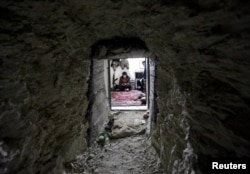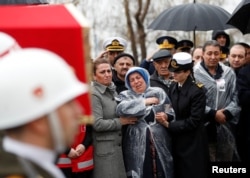A new opinion poll shows strong Turkish public support for Turkey’s military campaign in Syria against a Kurdish militia.
The A&G polling company questioned Turkish citizens about the campaign. It reported that 90 percent of those asked expressed support for Operation Olive Branch, the name of the military action.
President Recep Tayyip Erdogan has repeatedly told the public that Operation Olive Branch is a national struggle.
He told parliament last week, “Only Allah is victorious, and faith is more important than arms. If needed, we'll fight against the world.”
Turkey’s main media have all repeated Erdogan’s position, following a message with heavy religious overtones and talk of the country’s past.
Opposing voices, especially on social media, have faced arrest. Earlier this month, 24 people were arrested for publishing stories critical of the Syrian offensive on social media. Hundreds more have been detained.
Effect on upcoming elections
The aggressive reaction to criticism is seen by some observers as government nervousness over public support.
Huseyin Bagci is with the Middle East Technical University in Ankara. He said, ”People are supporting, yes. But are the people happy? I would doubt this. Every day, there are coffins, with politicians running from one funeral to another. It will not be easy in the long run for them.”
The military launched Operation Olive Branch against the Kurdish militia YPG in January. Turkish officials have described YPG fighters as terrorists and linked the group to a rebellion inside the country. However, the militia is receiving assistance from the United States in the fight to contain Islamic State militants.
"There is a national pride among Turks for this operation," said Cengiz Aktar, a political scientist. "We can safely say today, he ((Erdogan)) will win all the upcoming elections this year and next year.”
By 2019, Turkey will have faced three elections: local, general and presidential. Some observers think that Erdogan will call early elections to make the most of the nationalist feelings.
Observers say two questions are likely to affect him. The first is, how widespread is public support for Operation Olive Branch? The second: will the current level of excitement lead to votes for the Turkish leader?
Recent opinion polls have shown little change in support for Erdogan or his ruling AK party. While he has a big lead over his political opponents, polls show he is still short of the required 50 percent plus one vote needed to win re-election.
Since the launch of Operation Olive Branch, over 30 Turkish soldiers have been killed. Observers note that there have been few public demonstrations of support in Turkey’s main cities.
Differences with the U.S.
On Friday, top diplomats from Turkey and the United States met in Ankara to discuss their differences in Syria. The two sides agreed to try to rescue a strategic relationship that U.S. officials admitted had reached a crisis point.
After the meeting, U.S. Secretary of State Rex Tillerson spoke with reporters. He said, "We find ourselves at a bit of a crisis in the relationship.”
Tillerson called on Turkey to "show restraint in its operation.” But he added that the two countries "share the same objectives in Syria."
At the Ankara talks, Turkey proposed a joint deployment in Syria if YPG fighters leave territory near the border.
Dorian Jones reported this story for VOANews.com. George Grow adapted his report for Learning English with additional report from Reuters. Hai Do was the editor.
________________________________________________________________
Words in This Story
Allah – n. the name of God in Islam
faith – n. belief
overtone – n. a secondary meaning or effect
doubt – n. questioning of one’s belief or opinion
coffin – n. a box for buying human remains
pride – n. feeling that you are better or more important than other people
survey – n. a study
strategic – adj. useful in carrying out a plan or reaching a goal
We want to hear from you. Write to us in the Comments Section.











